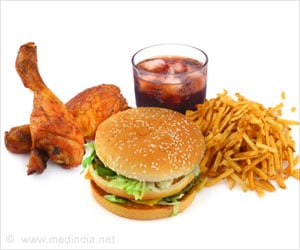Rahul Verma filed a complaint with public concern to ban the sale of junk food, snacks near schools to protect children from obesity and diabetes.
Highlights
- Rahul Verma, a common man in Delhi filed a complaint to ban the sale of junk food and soft drinks in and around schools across India.
- His concerns state that children whoare unhealthy and those who are normal should stay away from junk food for better health.
- Diets rich in carbohydrates and fat spread to less affluent rural areas and can increase the risk of diabetes.
Rahul Verma's son was born gravely ill with digestive problems, but over years of visits to the boy's endocrinologist, Verma saw the doctor grow increasingly alarmed about a different problem, one threatening healthy children. Junk food, the doctor warned, was especially dangerous to Indians, who are far more prone to diabetes than people from other parts of the world.
"On one side you have children like my son, who are born with problems," said Verma, "and on the other side you have children who are healthy and everything is fine and you are damaging them giving them unhealthy food."
Since 1990, the percent of children and adults in India who are overweight or obese has almost tripled to 18.8 percent from 6.4 percent, according to data from the Institute for Health Metrics and Evaluation at the University of Washington. The International Diabetes Federation projects that the number of Indians with diabetes will soar to 123 million by 2040 as diets rich in carbohydrates and fat spread to less affluent rural areas.
In the years since the court ordered the government to develop guidelines to regulate junk food, the case has encountered opposition from the All India Food Processors Association, which counts Coca-Cola India, PepsiCo India and Nestle India as members, as well as hundreds of other companies.
No Ban on Advertising
The government this year took a significant step that public health experts believe will help combat the rise of obesity. It partially implemented a tax on sugar-sweetened beverages, instituting a 40 percent tax on such drinks that are carbonated, though not on juices made with added sugars that many children drink.
But so far, the regulations to ban sales near schools sought by the court in Verma's case have led to naught.
Pawan Agarwal, chief executive of the Food Safety Standards Authority of India, the body in the ministry responsible for such regulations, insisted that the government's efforts have been sincere. "This may appear to be typical of India. When you have an issue, you set up so many committees and confuse the whole issue," he said. But he insisted: "People are concerned. They want to do something about it. Therefore everyone is setting up committees."
Diabetes Risk in Indians
Scientists searched for genes that predisposed Indians to diabetes, but did not find them. Instead, a growing body of research suggests that Indians' body type — one that is smaller but with more abdominal fat — may be responsible.
Being born to a malnourished woman — a common phenomenon in India — may also increase the odds of developing diabetes.
Dr. Chittaranjan Yajnik, a diabetes specialist, and Barry Popkin, a professor of nutrition at the University of North Carolina, are among the researchers exploring a theory that Indians evolved what Yajnik has called "a thin-fat" body type over millenniums as a way to survive famines when monsoons failed.
In the 1990s, Yajnik began following the pregnancies of hundreds of women in villages outside Pune, a city in western India and tested their offspring as they grew up. Compared with infants in Britain, Indian newborns were about 1.5 pounds lighter but had more abdominal fat and higher levels of certain hormones in their cord blood, suggesting a predisposition to diabetes.
Yajnik said he believes Indians' susceptibility to diabetes may have emerged as their diets changed with rising affluence and that their bodies, attuned to scarcity, couldn't handle an overload of food.
Although obesity and overweight are far less prevalent in India (24 percent last year) than in Canada (about 60 percent), for example, adults there are just as likely to develop diabetes as in Canada, a New York Times analysis of data from the Institute for Health Metrics and Evaluation found.
Legal Petition Not Effective Enough
In early 2015, the food authority in the Health Ministry finally recommended regulations to the court, including some limitations on the sale of junk food around schools. The judge ordered the recommendations carried out within three months. Instead, the food authority appointed yet another committee.
Agarwal, chief executive of the food authority, insisted his agency is finally ready to start adopting new rules early next year for labeling healthy food with a green light and those high in fat, sugar, and salt with a red light. But he said taxing junk food and banning it around schools were long-term goals.
The cause for the fight was very justifiable yet, the big banners which produce junk food, including sugar-sweetened beverages fail to own it up and find alternate healthy food products that do not cause any damage to health.
Source-Medindia
















